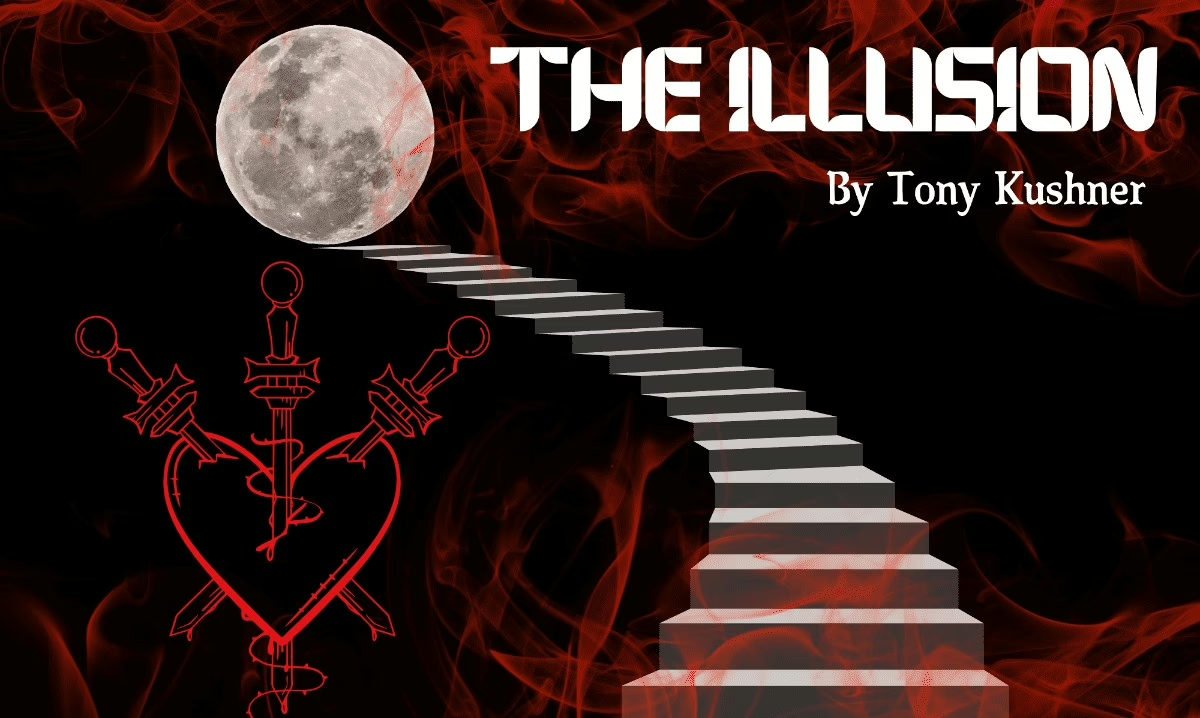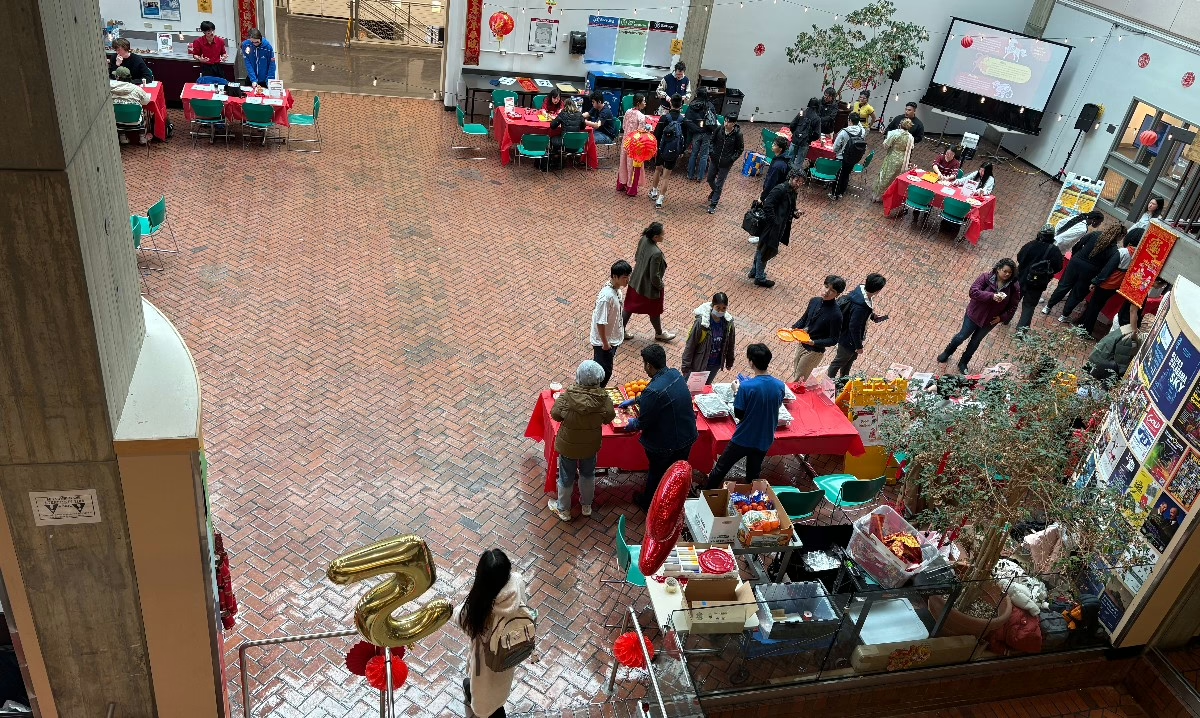Behind the scenes: Voices of the stars
Seattle Central is staging a production of “The Illusion” by Tony Kushner this spring. It is adapted from Pierre Corneille‘s 17th-century comedy, L’Illusion Comique. The play follows a father’s attempt to find his long-lost son. In his search, he witnesses snippets from his son’s life and is left questioning who his son truly is. The play ends on a high, surprising note, but like all theater, it’s open to interpretation. With that in mind, the following reflections come from the members of this production, directed by Shelley Douma.
Andrew Carroll, assistant director, returned to this year’s production in a new role in last spring’s Detonazione-inspired play.
“After acting in several roles for last year’s detonazione-inspired spring play, I knew I wanted to be involved again this year in some capacity,” he said. “I considered auditioning for a role, but then Shelley surprised me with an invitation to come on as her assistant director. I had never done that before, so I borrowed Vrindha’s copy of the play, read it through in one sitting that same evening at the Rabbit Box in Pike Place, fell in love with the script, and immediately texted Shelley, ‘I accept!’”
Carroll called the production “pure magic.”
“It’s everything you want theatre to be: fast-paced, dynamic, while still resonant with eternal themes; dramatic and tense and yet perfectly campy; entertaining while still finding space for lingering reflection; and light and humorous yet richly fielded with truly lovely language. This play has dozens and dozens of examples of le mot juste—the metaphors go deeply down, to their etymological roots, and still sprout as playful flowers.”
He emphasized how the experience has impacted both his academic and creative work.
“You can enjoy it at any level you like, and it works across them all. Beyond the script itself, the experience of assistant directing with Prof. Douma has been extremely beneficial to my own fledgling career, for both my acting and my pedagogy. I hope to continue my theatre passions on the side, while pursuing a career as a college professor. I have learned so much from watching Shelley interact with the whole team as wonderfully and wisely as she always does—and I am picking up everything I can to improve my own teaching skills.”
Carroll also reflected on how directing has influenced his approach to acting.
“Directing has also given me some unique insights into acting. It’s been very educational for me to take a broader look at the play and the roles, and the language therein. Such circumnavigatory efforts can only enrich later concentration, so I imagine I’ll always be doing as much dramaturgy work as I can for any subsequent acting roles I receive. In fact, I just got booked for a role in an upcoming production, and have already dug into the script with my now-developing director’s eyes . . .”
Carroll hopes that his experience performing in last year’s production has been helpful to this year’s cast. Still, he admits he’s likely learning more from them—about theater, pedagogy, and the ongoing nature of both—than they are from him.
“Theatre is detail,” Carroll said. “There’s always more to see.”
Now, for the voices of the cast, starting with Finnick Burke.
“Getting to return to the theater with such a funny and adaptive play that is more of a classic has been incredibly fulfilling. Though there is an intense amount of more floral and descriptive language, it being a French play from the 1600s that was translated in the ‘90s, I find it really interesting how a lot of the humor and themes are still relevant today. Additionally, working with this cast has been wonderful. The adaptiveness, friendliness, and welcoming nature of everyone involved, I believe, can and will be translated into the performance on stage. Rehearsals are filled with laughter, smiles, and fun. Hopefully, our performances will be too,” states Burke.
Robin Adams reflected on returning to the theater with a small cast after a break post-high school.
“Coming out of high school, I hadn’t done any theatre projects for a while, and hadn’t been in a cast this small before, Adams said. “I already knew Shelly through the classes I’d taken with her, and she’s always been a very open and accepting teacher, so I knew she’d be a good director. Getting our books and working on memorizing our parts outside of rehearsals, while we got to know each other in it.”
Adam said Douma made a strong effort to help the cast connect, which brought them closer. “As the days progressed, I got to know my castmates pretty well, and that’s what made me the most comfortable. It was easy going at first, mostly practicing on book and testing the waters.”
As opening night approached, Adams said memorizing lines became more challenging than expected. “Sometimes, you get on stage and although you’ve memorized everything, you completely blank up there. Everyone is very helpful and understanding, though, and Shelly and Andrew push us to be better in a good way. Honestly, I love the opportunity to do this. I get to act, which I like, and I do it with people I like as well. It’s also in a more professional setting than a simple acting class, so everyone takes it seriously. All in all, it’s been a fun experience I’d love to have again.”
Maddie Roberts emphasized how theater creates a unique space for deep connection.
“Over the years I’ve been doing theater, I’ve realized that, due to the nature of theater, it has a special ability to create a very close-knit cast. Come on, you’re spending nearly every day for at least a month with a group of people who want to talk and tell stories as an art, of course, everyone’s going to bond. I’ve also realized that some productions have an even stronger predisposition toward this. ‘The Illusion’ is one such show.”
Roberts said the smaller cast and script themes prompted deep discussions about the character and the world.
“We’ve had amazing discourse about different experiences we’ve had, other information that others may have in their back pockets, and the new insight that the script gives us to see the world.”
Jordan Backschies described “The Illusion” as a mysterious play that challenges audiences to reconsider what is real. “’The Illusion’ is a play of mystery and within it, a call to reconsider the bounds of reality: ‘What in this world is real and not seeming?’” Backschies said.
“It’s not all sorcery and tricks, though. ‘The Illusion’ is grounded in a wide collection of very real topics, ranging from more classic ‘daddy/mommy issues’ to dealing with classism and violence to loving someone through the struggles of life despite the heartache that comes with it.”
Backschies added that the show balances comedy with depth. “While the show is a comedy (and the hilarious performances will have you dying of laughter), the use of humor in it does not overshadow the touching depth conveyed excellently by both casts.”
Backschies spoke highly of the cast dynamic, especially the sense of unity between the principal and understudy groups. “The casts may be divided in name and performances into principals and understudies, but if you were to watch any rehearsal, you’d see that there is no divisiveness, no hierarchy or cliqueiness. We all run lines together, goof off together, and lean on each other for support. My castmates and I have all built true bonds with each other that I feel lucky to be a part of.”
“No one sees each other as competition,” they continued, “but instead as resources for the best performance possible, more talented minds to bounce ideas off of. And we have some pretty good ideas if I do say so myself. The Illusion has truly been my favorite show I have ever worked on, and the best environment by far. Any performance you see, regardless of who is playing each role, will not be one you’re soon to forget.”
From the director’s chair to the heart of the stage, “The Illusion” is more than just a production—it’s a shared journey of discovery, laughter, and connection. Each voice speaks of the depth of the play but screams passion for this craft, this perfect dream, “a dream which makes the world seem.. an illusion,” as Alcandre says in “The Illusion.”
Last year, the Drama committee staged “Love and Information.” Whether this year’s production of “The Illusion” will surpass it remains to be seen, but it offers a performance worth watching.

Vrindha, an international student from India, is fueled by her fervent love for diverse art forms such as dance, drama, music and theatre. Eager to immerse herself in new experiences and broaden her horizons, she sees her involvement with the Collegian as a gateway to both sharing her passions and delving into new realms of knowledge.







